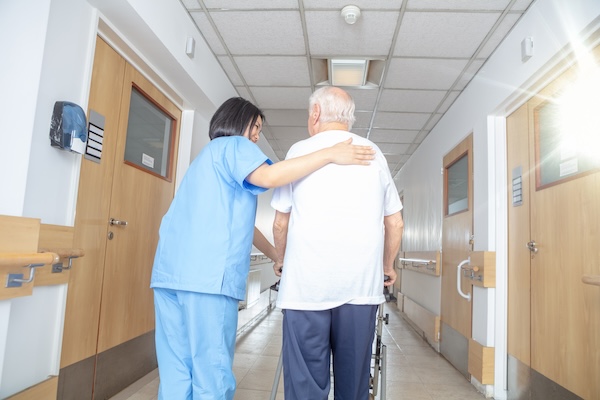Parkinson’s Support Group Offers Hospital Safety Information for Patients and Care Partners
Safety means something a little different to people living with Parkinson’s. Celebrating National Safety Month, the Parkinson’s Support Group in and nearby The Villages hosted a presentation of hospital safety tips on June 26.
Rose Lang, a volunteer for the Parkinson’s Foundation, knows about Parkinson’s from her husband who was diagnosed 16 years ago when they still lived in Pennsylvania. Rose and her husband, John, moved to The Villages because of the great support network there for people living with Parkinson’s as well as access to excellent medical care at the Fixel Institute in Gainesville, a Parkinson’s Center of Excellence.
Rose recommends learning about Parkinson’s as soon as you, or a loved one, are diagnosed. A retired pharmacist, Rose says, “In pharmacy school, we learned a lot about the disease but very little about how it affects the patient, so we often need to educate other health care professionals, as well.”
One of Rose’s volunteer projects is to educate hospital staffs about the unique aspects of caring for Parkinson’s patients, in addition to preparing Parkinson’s patients and their care partners for the inevitable hospital stay.
People with Parkinson’s have a greater risk of being hospitalized than the general population. During those hospitalizations, three out of four people will not get the right medication on time. Two out of the three will have complications as a result, all of which are avoidable complications. One out of 10 people receive contraindicated medications.
The first challenge Rose notes about being hospitalized is not being identified as a Parkinson’s patient. Even is the staff knows how to treat someone with Parkinson’s, they might not think to ask on the intake if you have Parkinson’s. If you are admitted through the emergency room and are incapacitated from an accident or heart attack, you may not be able to tell them.
Any hospital stay can be detrimental for someone with Parkinson’s even under the best conditions. Parkinson’s medications are very specific and often require multiple doses per day – in accordance with a strict administration schedule. Typical hospital stays do not allow for regular patient movement, another essential for people living with Parkinson’s. After a week in the hospital, the cardiac condition may be under control, but Parkinson’s symptoms will flare making everything else feel out of control.
Whenever you enter the hospital, for whatever reason, these items need to be communicated:
- I need my hospital chart to include my exact medications and match my at-home schedule.
- I need to take my Parkinson’s medications within 15 minutes of my usual schedule.
- I need to avoid medications that make my Parkinson’s worse including those that block dopamine, sedatives and certain pain medications.
- I need to move my body safely and as regularly as possible, ideally three times a day.
- I need to be screened for swallowing changes to minimize my risk of aspiration pneumonia and weight loss.
Rose also recommends having a go-bag packed and ready to grab whenever you have to go to the hospital in a hurry. The bag should include multiple copies of your medication list and dosing schedule, a week’s supply of your medications in their original, labeled bottles, and a doctor’s letter informing hospital staff how to reach your regular neurologist and what medications you cannot take because of your Parkinson’s.
When it comes to planned hospitalizations, such as for surgery, Rose had some additional tips. She noted that Parkinson’s medications can be taken on schedule right up until the time of surgery, despite the pre-surgery fasting protocols. Anesthesia can increase or exacerbate Parkinson’s symptoms, so the pre- and post-surgery medication protocols should be discussed with the doctor.
“You may need to educate the doctors in the hospital about what’s best for you as a Parkinson’s patient,” Rose says. “Learning as much as you can about the disease will help you be your own advocate.”
You can download or order a Hospital Safety Guide from the Parkinson’s Foundation.
For more resources about living with Parkinson’s, visit the Villages PD Community website.

